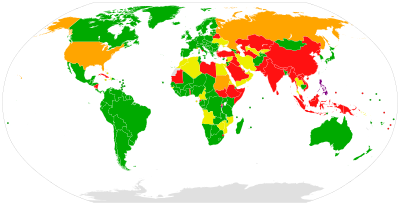United States and the International Criminal Court
He nonetheless supported the proposed role of the ICC and its objectives: The United States should have the chance to observe and assess the functioning of the court, over time, before choosing to become subject to its jurisdiction.I believe that a properly constituted and structured International Criminal Court would make a profound contribution in deterring egregious human rights abuses worldwide, and that signature increases the chances for productive discussions with other governments to advance these goals in the months and years ahead.[21] The Heritage Foundation has stated that: The true measure of America's commitment to peace and justice and its opposition to genocide and war crimes lies not in its participation in international bureaucracies like the ICC, but in its actions.The U.S. has led the charge to hold violators of human rights to account, including fighting hard for imposing Security Council sanctions on the Sudanese government until it stops supporting the militia groups that are committing genocide in Darfur and helps to restore order to the region.[22]In a 2005 poll of 1,182 residents of the United States by the Chicago Council on Global Affairs and the Program on International Policy Attitudes at the University of Maryland, 69% favored U.S. participation in the ICC.Prior to ratification, what should the United States relationship with the Court be, particularly in regards to sharing intelligence, prosecuting war criminals, and referring cases to the U.N. Security Council?Obama answered: "Yes[.]"[26][27] He also later stated: "We should publicly remind Khartoum that the International Criminal Court has jurisdiction to prosecute war crimes in Darfur and that Sudanese leaders will be held personally accountable for attacks on civilians.[29]Clinton later added: Consistent with my overall policy of reintroducing the United States to the world, I will as President evaluate the record of Court, and reassess how we can best engage with this institution and hold the worst abusers of human rights to account.At present we fortunately have a President who opposes the ICC, but ultimately it is up to Congress – and concerned citizens – to insure that no American ever stands trial before an international court."[32] Dennis Kucinich, Democratic member of the United States House of Representatives and a presidential candidate in the 2004 and 2008 elections, said on April 26, 2007: As president of the United States, I intend to take America in a different direction, rejecting war as an instrument of policy, reconnecting with the nations of the world, so that we can address the real issues that affect security all over the globe and affect our security at home: getting rid of all nuclear weapons, the United States participating in the chemical weapons convention, the biological weapons convention, the small arms treaty, the landmine treaty, joining the International Criminal Court, signing the Kyoto climate change treaty.[33]John Edwards, the former Senator and the Democratic Vice-Presidential candidate in 2004, called for America to be part of the court when campaigning for the 2008 Democratic nomination,[34] saying: We should be the natural leader in ... these areas ... when America doesn't engage in these international institutions, when we show disrespect for international agreements, it makes it extraordinarily difficult when we need the world community to rally around us ... we didn't used to be the country of Guantanamo and Abu Ghraib.[36] The position of the Bush administration during its first term in office was to unalterably oppose U.S. ratification of the Rome Statute, believing Americans would be unfairly treated for political reasons.[42] On November 16, 2009, the Ambassador-at-Large for War Crimes Issues, Stephen Rapp, announced that he would lead the U.S. delegation to the ICC's annual meeting of the Assembly of States Parties in The Hague.The Obama administration made no formal policy decision on the ICC or the status of the BIAs,[citation needed] and did not state an intention to rejoin the Rome Statute or submit the treaty to Senate ratification.[44] Speaking about the past and future of U.S.–ICC relations in light of the Review Conference, Harold Koh, Legal Adviser of the State Department, declared in 2010: After 12 years, I think we have reset the default on the U.S. relationship with the Court from hostility to positive engagement.[51] On April 2, 2021, President Joe Biden lifted the Trump-era sanctions against Bensouda and Phakiso Mochochoko, head of the ICC's Jurisdiction, Complementarity and Cooperation Division.[54][55] When the ICC began considering arrest warrants for Israeli Prime Minister Benjamin Netanyahu and Defense Minister Yoav Gallant over Israeli war crimes committed during the Israel–Hamas war in the Gaza Strip, Biden was opposed,[56][57] denouncing the chief investigator's request for arrest warrants as "outrageous", pledging "ironclad" support for Israel.Representative Tom Cotton (R-AR) called for military force, according to the domestic law The Hague Invasion Act, to use "all means necessary and appropriate.""[65] Senator Bernie Sanders (I-VT) expressed his support for the warrants, describing the ICC's charges as well-founded and warning that "If the world does not uphold international law, we will descend into further barbarism."[66] On January 9, 2025, the U.S. House of Representatives passed the Illegitimate Court Counteraction Act by 243-140 to sanction the ICC in protest at its arrest warrants for Netanyahu and Galant issued in November 2024.The first was enactment of the "Nethercutt Amendment", which extended prohibitions on assistance to ICC parties beyond those already in place under the American Service-Members' Protection Act (ASPA).[22] In 2002, the U.S. Congress passed the American Service-Members' Protection Act (ASPA), which contained a number of provisions, including authorization of the President to "use all means necessary and appropriate to bring about the release of any U.S. or allied personnel being detained by, on behalf of, or at the request of the International Criminal Court",[69] and also prohibitions on the United States providing military aid to countries which had ratified the treaty establishing the court.In addition, the Chairman of the Joint Chiefs of Staff, Air Force General Richard Myers,[74] testified at the Senate Appropriations Defense Subcommittee on April 27, 2005, that the ASPA has reduced foreign troop training opportunities and hurt the government's ability to fight terrorism abroad as an "unintended consequence".Until 2008, the ASPA and the Nethercutt Amendment required the cessation of ESF to those states which had ratified the Rome Statute unless they signed a BIA (though they could be exempted from this if they were a member of NATO or a major non-NATO ally).[81] Mali, Namibia, South Africa, Tanzania, and Kenya publicly rejected signing BIAs in 2003, and subsequently saw their development aid funding cut by more than 89 million dollars.[82] According to the Coalition for the International Criminal Court, as of 2006, 52 countries had "rejected U.S. efforts to sign bilateral immunity agreements (BIAs), despite unrelenting U.S. pressure and the threat and actual loss of military assistance".By 2009, with Obama in office, the laws cutting aid unless BIAs were no longer in place; the Nethercutt Amendment had not been renewed, and the restrictions mandated in the ASPA had already been repealed under Bush.In response to Romania's action, the European Union requested that candidate countries not sign Article 98 agreements with the United States until the EU ministers had met to agree upon a common position.[85] The Secretary-General of the United Nations, Kofi Annan, said that the U.S. proposal "flies in the face of treaty law", risks undermining the Rome Statute, and could end up discrediting the Security Council.However, the Security Council refused to renew the exemption again in 2004 after pictures emerged of U.S. troops torturing and abusing Iraqi prisoners in Abu Ghraib, and the U.S. withdrew its demand.





Parties
Parties for which it has not entered into force
States that were parties to the Statute but withdrew
Signed but not ratified
Signed but subsequently withdrew its signature
Neither signed nor acceded
The HagueUnited StatesRome Statute of the International Criminal CourtInternational Criminal Court125 states are members of the CourtIndonesiaClinton administrationSenateGeorge W. Bush administrationObama administrationcrimes of aggressionUnited Nations General AssemblyIsraelBill ClintonGeorge W. BushU.N. Secretary-GeneralVienna Convention on the Law of TreatiesAmerican Non-Governmental Organizations Coalition for the International Criminal Courtmunicipal lawConstitutionTreaty ClauseArticle Twopublic international lawU.S. Supreme CourtentrenchedArticle SixSupremacy ClauseWare v. HyltonReid v. CovertunconstitutionalIrelandnational referendum on the issue in 2001amendmentsjury trialserrors of facthearsayspeedy trialpublic trialreasonable baildue processMonroe Leighchild soldiersThe Heritage FoundationInternational Military Tribunal for the Far EastNuremberg trialstribunals for the former YugoslaviaRwandaChicago Council on Global AffairsProgram on International Policy AttitudesJohn McCainKhartoumHillary ClintonRon PaulBill RichardsonGovernor of New MexicoDennis KucinichUnited States House of RepresentativesJohn EdwardsVice-Presidential candidate in 2004Benjamin B. FerenczNazi war crimesWorld War IIEinsatzgruppen trialsubsequent Nuremberg trialsits international relationsAmerican Service-Members' Protection ActJohn BoltonDarfurUnited Nations Security Council Resolution 1593State DepartmentLegal AdviserJohn BellingerU.S. House of RepresentativesBarack ObamaAmbassador-at-Large for War Crimes IssuesStephen RappSenate Foreign Relations CommitteeSecretary of StateSusan RiceU.S. Ambassador to the United NationsSecurity CouncilsanctionsReview Conference of the Rome StatuteKampalaUgandaNorwayDemocratic Republic of the CongoLord's Resistance ArmyJoseph KonyHarold KohDonald TrumpUnited Nations Human Rights CouncilProsecutor of the International Criminal CourtFatou BensoudaWar in AfghanistanMike PompeoJoe BidenPhakiso MochochokoAntony Blinkenarrest warrantPresident of RussiaVladimir PutinMaria Lvova-BelovaRussian invasion of Ukrainedeported children from Ukraineconsidering arrest warrantsBenjamin NetanyahuYoav GallantIsraeli war crimesIsrael–Hamas warGaza StripLinda Thomas-Greenfieldissued arrest warrantsLindsey GrahamChuck SchumerMike WaltzTom CottonThe Hague Invasion ActJohn FettermanJared MoskowitzJacky RosenRitchie TorresRashida TlaibBernie Sandersmilitary aidmajor non-NATO allies